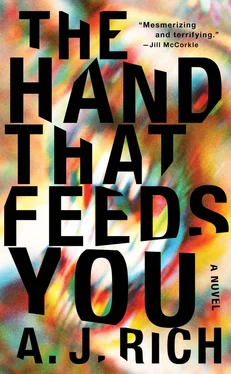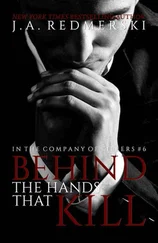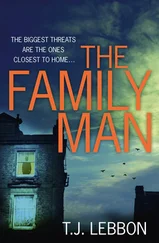“Do you consider yourself a hoarder?”
“The potential is there. I was the kid who brought home every stray cat and dog, every featherless baby bird who fell out of a nest. You know what? Those baby birds were diseased. That’s why their mothers threw them out in the first place. I brought one home and it ended up killing my beloved parakeet.”
“Should people stop being kind because of unforeseeable consequences?”
I reached for a Kleenex from the box on the low table between us, though I didn’t need it; I wasn’t crying, I just wanted to crush something with my hands.
“Was Bennett’s death unforeseeable?” I asked. “What about the mother of a newborn who keeps a pet python? What about a woman who takes in her evicted boyfriend and then doesn’t believe what her daughter says he does to her?”
“Is that the kind of predator you study?”
“I study victims.”
I finally told her how I met Bennett. He was the control subject I’d been looking for. Yes or no. He would rather be right than happy. He often feels challenged. He enjoys feeling protective of women. He enjoys feeling powerful with women. Women lie to him. On all criteria, Bennett fit the type B personality, the nonaggressive male, the type of guy your mother wants you to marry. I never went for men my mother approved of. That’s why his charming response to my online persona caught me off guard. The e-mail wasn’t flirty. He didn’t use the computer screen as a mirror to primp in. He didn’t use I once in his first response. I count I ’s. The average male responder uses it nineteen times in the introductory e-mail. You normally appears less than three times. Bennett’s e-mail was in the form of a questionnaire. What book would you not take to a desert island? What’s your favorite-sounding word in the English language? Do you like animals more than people? What song makes you cry but you’re ashamed to admit it? Where would you not take a vacation? Do you think numbers radiate color?
“Do you think Bennett was your victim?” she asked.
Why did he have to be? I could not get past the why of it. The pitties had not threatened him, except for Chester’s initial behavior protecting me. Bennett had not been afraid of them, he said, but he did make a point of telling me about the time Chester had snarled at him when he tried to remove the frozen marrow bones I had left for the dogs. Bennett wasn’t an animal lover, but there was provisional acceptance. How had he treated them when I wasn’t there?
“Why did you choose to study victimology?” Cilla asked.
“I think it chose me.”
Victims become survivors only after the fact. How is a victim chosen?
Say five schoolgirls are leaving a playground. The predator is sitting in his car across the street. His method of selection in no way resembles a wolf pack choosing a lame elk, or does it?
He studies the gaits of each of the girls, how her dominant personality trait — shy, brazen, alert, dreamy — determines her carriage and stride. He will hold back from choosing his victim until one that meets his needs comes along. The first girl to leave skips as she walks: me as a schoolgirl. She would be an easy choice, but this particular predator doesn’t want a “skipper.” Skippers, it turns out, make troublesome prey. They fight back. The second girl who catches his eye is flanked by laughing friends, and although she is his type, he doesn’t want to work that hard to separate her and risk failing. The third girl is yelling into her smartphone, and the fourth possibility is dressed too mannishly for his taste. The fifth girl is slightly overweight and twists a hank of her bangs as she walks. Most of her face is hidden behind her hair, a reliable sign of low self-esteem and emotional withdrawal. The “twister” never fights back. She already knows she’s a victim; if not now, some other time. He won’t have to bother to charm her. Does the wolf have to charm the lame elk?
The method of approach is a term that refers to the offender’s way of getting close to his victim. It provides clues about the offender, such as his social skills, physical build, and ability to manipulate. The three general methods of approach are the con, the surprise, and the blitz. The con describes someone who deceives a victim into believing he needs help — think Ted Bundy with the cast on his arm, asking young women to help him get something from his windowless van. The surprise is someone who lies in wait, then quickly subdues that person — think slasher under the car waiting for women to finish shopping and unlock their minivan, his target the Achilles tendon so his intended victim cannot run away. The blitz requires rapid and excessive use of force to quickly overcome the victim’s defenses — think home invasion in which anyone unlucky enough to be there is swiftly killed or raped and killed.
Risk assessment refers to the likelihood of a particular person’s becoming a victim. Victim risk is broken into three basic levels: low risk, medium risk, high risk. These ratings are based on their personal, professional, and social lives. The prostitute is the obvious example of a person at high risk: exposed to a large number of strangers, often in contact with drug users, often alone at night, and unlikely to be missed. A low-risk victim has a steady job, lots of friends, and an unpredictable schedule.
But what if there was a different kind of risk factor, the risk of being too trusting, not because of gullibility, but because of compassion. What about the little girl who is lured into the predator’s car because he asks her to help him find a lost kitten?
This is how it works for humans.
I studied under a psychiatrist who allowed his patients to bring their dogs to sessions. He told me about one patient who arrived with her well-behaved shepherd mix who remained in a down-stay at her feet even while she waved her arms to make her agitated points with considerable drama. But another patient, on antipsychotic meds, sat uncommonly still beside his Gordon setter, speaking in a calm monotone, and his dog got up and paced nervously in the office, even growling low and showing flattened ears. The point? That dogs can differentiate between neurotic behavior and behavior that is truly a threat.
Did Bennett threaten the dogs?
• • •
Cilla helped me compose a condolence letter to Bennett’s parents. Bennett had shown me a picture of them. His old father was playing a button accordion in a farm kitchen while his mother danced in her apron. When Cilla asked me what he had told me about them, what I recalled was generic. He offered little and I wished I had asked more about them. Cilla advised me not to make the letter about my loss.
My brother, Steven, asked one of his law firm’s investigators to ferret out an address for them since the police weren’t able to find one: M. Jean-Pierre and Mme. Marie Vaux-Trudeau in Saint-Elzéar, Quebec, a town of less than three thousand.
“The parents don’t exist,” Steven told me when he next came to visit me in Bellevue. I was beginning my second week there and he had been coming almost every night. We sat on plastic chairs in the common room while on television Happily Never After was on the Investigation Discovery channel. Imagine filling an entire season with stories about spouses who killed each other… on their honeymoon. My roommate, Jody, had tagged along, knowing Steven always brought chocolate. She sported her earbuds to give us privacy, but I saw her turn off the sound.
“You mean your investigator couldn’t find them,” I corrected him.
“Next time, Steve,” Jody interrupted, “could you get the kind with bacon bits and salt?”
Читать дальше

![Корнелл Вулрич - Eyes That Watch You [= The Case of the Talking Eyes]](/books/32103/kornell-vulrich-eyes-that-watch-you-the-case-of-thumb.webp)









